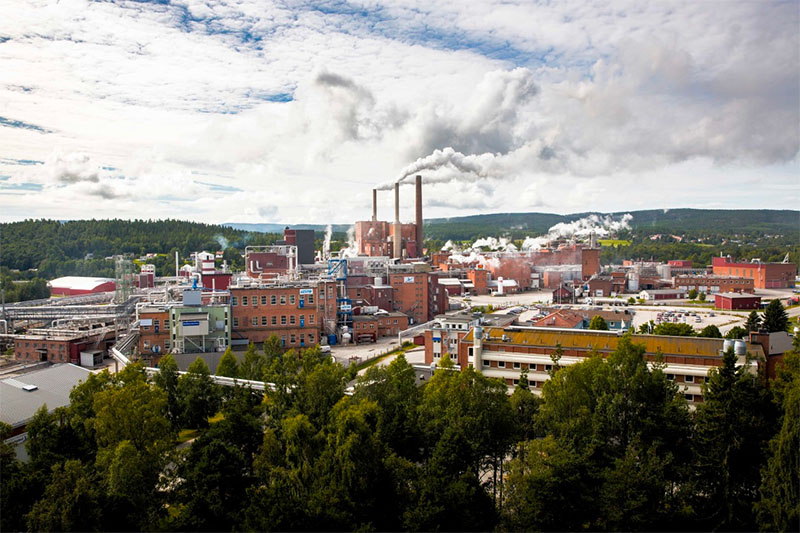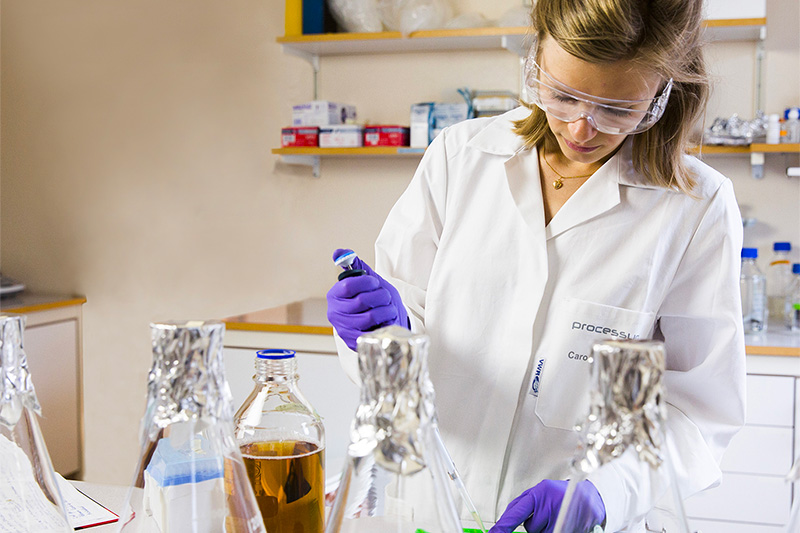In an age overshadowed by the imminent threat of global warming, as people increasingly realize the importance of replacing oil with fossil-free options, Processum has emerged as a major player. Processum has become a hub for research into the potential of using biorefineries to transform forest-based raw materials.
“In many ways, our location is unique”
The Domsjö development area area is located in the northernmost reaches of the High Coast region. A diverse cross section of industries has already been based in the area for a century: a pulp mill, chemical plant, chlorate factory and energy production facilities to name just a few.
At first glance, that list might not conjure images of companies engaged in committed environmental work, but appearances can be deceiving. The development area is now a well-established and internationally renowned ecosystem that supports a thriving forest-based biorefinery. Government representatives, researchers, and business leaders from around the world flock to the High Coast to learn more about innovations that could change and improve our planet’s future by making it more environmentally sustainable. Processum is one of the primary driving forces behind that effort. It leads and supports research development and innovation related to forest-based biorefining.
In the 14 years since Processum was founded, the organization has gone from being a local technology park to becoming the hub of a cluster of biorefineries, and is now involved in both cross-industry and international collaborations. There are now 27 people working in the organization. Thanks to its merger with RISE, Sweden’s largest research institute, Processum also has access to another 2,000 colleagues throughout Sweden.
“I’m impressed by how skilled and committed our employees are,” says Magnus Hallberg, the CEO of Processum. “As our brand has gotten stronger and we’ve started focusing on the issue of climate change, it’s become easier to find great new hires. People who are very dedicated to protecting the environment and to advancing biorefining come to us and want to be a part of the business.”
Over the years, Processum and its partners have built an impressive pilot equipment park that continues to grow. The pilot projects being carried out make it possible to upscale processes involved in biorefining – from the laboratory scale to nearly a full scale level in some cases.
Europe’s first pilot facility for the production of crystalline nanocellulose, CNC, has also been constructed in the area. CNC may prove to be a significant material with a wide range of applications. It is strong and lightweight, and has numerous exciting properties. For example, the material may have medical applications; it could be used to direct drugs to predetermined sites in the body. It can also add entirely new properties to the consistency of paint and food, or be used in the production of strong and lightweight vibration dampening and heat insulating materials.

The well-developed pilot park contributes significantly to the development area’s attractiveness.
“In many ways, our location is really unique,” says Magnus Hallberg. “Collaboration across company boundaries works well here, and has done so for decades. Several of the companies in the Domsjö development area have teamed up to build an advanced and integrated biorefinery that is already producing biogas, biofuel, green chemicals, dispersants, textile cellulose, and much more. This is the perfect place for us.”
Processum’s plans for the future are even more ambitious. The organization is heading up a preliminary study known as the Flagship Biorefinery. The aim of the project is to demonstrate how a large scale biorefinery based on sustainable Swedish forestry can contribute to development of the bioeconomy to which we all aspire. The study is supported by 13 businesses from a variety of relevant backgrounds, ranging from forest owners to forestry, chemical and retail companies. The goal is to develop a facility at which all production is energy self-sufficient and resource usage is maximized – a facility which will not only produce one million tons of textile cellulose, but will also be capable of producing other products such as green chemicals, biofuels, lignosulfonates, protein products and biogas.
“Our forests will play an important role in the necessary transition to a sustainable society,” predicts Magnus Hallberg. “Ever since Processum was founded in 2003, our motto has been that everything that can be done with oil, we can do better with forest-based raw materials. And it feels like that’s more true today than ever before. A number of biorefinery technologies are now ready for industrial scale-up, and within a few years I hope to see a lot of what we’re doing come to fruition in the form of full-scale biorefineries. And when that happens, why not build them here?”



